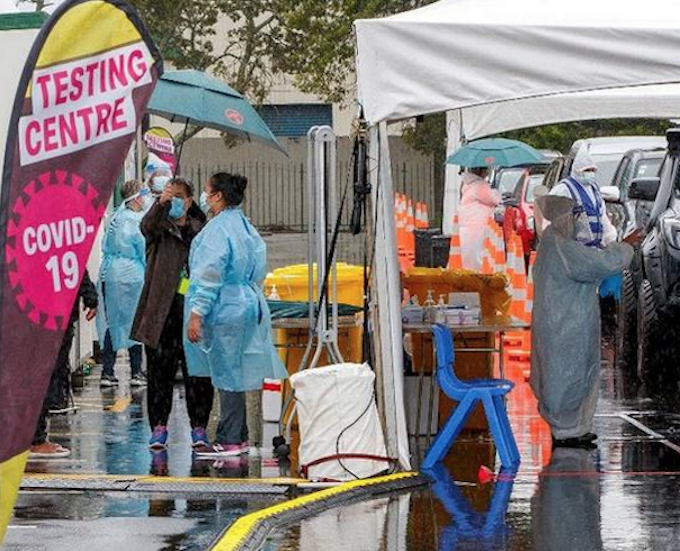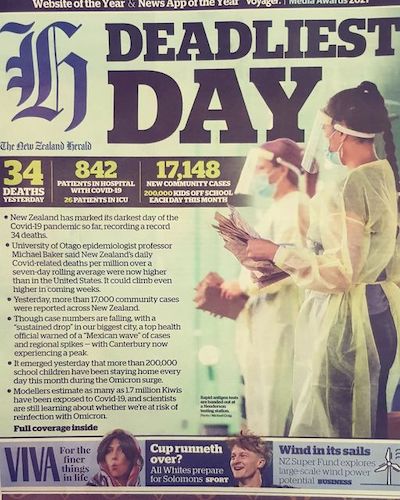
COMMENTARY: By Nick Rockel, a reflection as Aotearoa New Zealand yesterday experienced its worst day since the covid-19 pandemic began.
It came up in my Facebook memories that it was two years to the day on March 23 since Aotearoa New Zealand started its first lock-down. Coincidentally also the day many of the remaining restrictions and regulations relating to covid were relaxed or removed.
On this day two years ago Prime Minister Jacinda Ardern announced, “New Zealand has moved to Alert Level 3, effective immediately. In 48 hours, New Zealand will move to Alert Level 4”. We had our first case of community transfer that could not be traced to the border.
It would be seven weeks before we went down to level 2
- READ MORE: Covid-19 surge: Christchurch Hospital coping as region’s infections outstrip Auckland
- NZ public health chief encouraged in spite of 34 covid deaths and ‘Mexican wave’ cases
- Other NZ covid outbreak reports
New rituals were started, the daily health update at 1pm became must watch viewing — were the numbers going up or down? There was much excitement from certain family members each time schools being closed was extended.
We changed time zones — the kids waking hours shifted, staying up and getting up late, and while you nagged them to attend online classes it didn’t really matter.
We spent a lot more time with our teenage children than we would have otherwise. Created lots of memories albeit mostly based in the lounge, things like playing charades and enjoying Netflix and popcorn.
We laughed at the Aussies for buying all the toilet paper, meanwhile here shops ran out of flour, yeast, icing sugar, as everyone baked. Sourdough starter was the thing to do.
Consciousness cooking
Diets improved, there was little meat and what was available was wildly over priced. The kids got more involved in cooking, there was less food waste as we became more conscious than normal about what he had and needed to use up.
A good life lesson, and of course no takeaways or Uber eats.
The working world changed with Zoom “you’re on mute” meetings. Always interesting if the person in the meeting hadn’t put a background on, realistically we were often not in even the most casual of office attire.

Teddy bears appeared in windows as people started walking or cycling round the neighborhood. There were many small acts of kindness.
Sure we missed out on a lot of activities, dance classes and competitions, football seasons, school camps, and of course seeing friends and family.
At the beginning of covid, as we saw things change from an event in a part of China we probably hadn’t heard of to spreading around the world, we realised planned events that had seen many hours of preparation and fund-raising could not proceed. There would be many more cancellations and disappointments along the way.
But there were good things too.
Team of five million
The pride that the team of five million felt in how well the lockdown was working to stop the spread.
The excitement the day we reached zero community cases, the PM said she did a little dance — I’m sure she wasn’t the only one.
We moved forward with restrictions and people mostly were happy to cooperate. There was little sympathy for those breaking the rules, not following lock down restrictions, breaking out of MIQ etc. It felt like those people were letting the rest of us down by not doing their bit.
We had periods of relative freedom then more lockdowns. We were used to this now, after the announcement of new cases we’d jump on the supermarket site and try to get a delivery window — bugger none available.
The last of the big lock-downs was predominantly only Auckland. It was a long one and something unexpected and unprecedented happened — the rest of the country started to feel the love for Auckland.
I have to say as a long time resident, who despite living in Tamaki Mākaurau half my life never fully considered myself an Aucklander, I felt pretty bloody proud of the people of my city.
Vaccinations arrived and we watched the progress — could we get a high percentage vaccinated before the next wave came? The Vaxathon reminded those of us of a certain age of Telethons gone by — it was such a positive Kiwi thing. And yes, we quickly became one of the most vaccinated populations on earth.
Along with the vaccines came the mandates and passes. Most of us got it, could see why they were necessary and were happy to go along with them — heck who wouldn’t want to get a free vaccine against a virus killing millions around the world and protect yourself and others?
Dissent and dissatisfaction
“Some people who were no doubt a little reluctant to got vaccinated so they could go to work or take part in things. But some people didn’t want to be told to take the vaccine.
They wanted to be free to not take it and continue to do their jobs, take part in leisure activities, which put them into contact with those of us who had been vaccinated. Many of us had limited sympathy for this point of view.
The dissent or dissatisfaction of some became rich material for the political opposition who had struggled for oxygen with the daily updates from the PM and the Ministry of Health.
They and some reporters in the media found that an individual who was having a tough time as part of the restrictions, someone in MIQ unable to be with with a sick relative, someone missing a funeral, someone stuck overseas unable to get home, was given a lot of air time.
More coverage it often seemed than was given to the vast majority who were happy with things and grateful that we weren’t seeing the serious illness and deaths occurring overseas.
So what were the changes flagged last week?
We’ll be keeping the traffic light system to handle new variants or pressure on the health system.
Pragmatic steps
From Friday red-level indoor gathering restrictions are raised to 200 people, and there will no longer be limits of for outdoor gatherings including sports events, concerts, etc. There will also be no need to scan or sign in from this time.
From the April 5 no more use of vaccine passes will be required, and there will be no more mandates for education, police, the military, and staff in places like restaurants and bars. There will still be some mandates required in the health system.
These are pragmatic steps given the level of community spread and the lack of measures that could realistically contain it. But we also need to continue to protect our most vulnerable people from exposure to covid, I can see why the government has kept some restrictions in place.
Will those who have complained so much, the mandate protesters, the politicians and media, now draw a line under it? Move forward accepting that even if the government didn’t always get it 100 percent right they did bloody well most of time?
Yeah right!
Even after all the precautions and vaccinations my family and I eventually got covid a few weeks ago, pretty unavoidable without isolating such was the infection rate of the omicron strain.
Isolation felt like another lockdown except everyone around you in the community carried on with life as normal, and there was no sending a designated person to queue at the supermarket. Whereas the earlier lockdowns has been quiet this one was full of noise traffic and construction.
Remembering best of times
As we return to life with fewer restrictions we‘ll no doubt remember those days of lockdowns, the extra time with immediate family, taking pleasure in simple things, and yes the hard times and missed events that caused us sorrow.
This time will remain in the memories of those who are kids today and be something they annoy their own children and grandchildren with tales of many years from now.
Some will continue to work remotely, perhaps there will be a bit more consideration for those in our community who could do with a helping hand — even if it is just dropping off a few things at the letterbox. If there is another pandemic, a more dangerous variant, or some other event, we’ll be well placed to handle it calmly.
Dogs will remember lockdowns as the best of times; all of their people were home, even if they didn’t really go anywhere.
Many of us will remember that feeling of the nation coming together and wonder if maybe, just maybe, we could apply that same collective effort to addressing other problems we face as a society.
The last two years haven’t been easy but we bloody did it, we saved lives — think of the awful final hours in ICU that didn’t result for so many additional people due to those actions. It was worth it.
Nick Rockel is a “Westie Leftie with five children, two dogs, and a wonderful wife”. He is the publisher of the Daily Read where his article was first published. It is republished here with the author’s permission.














































